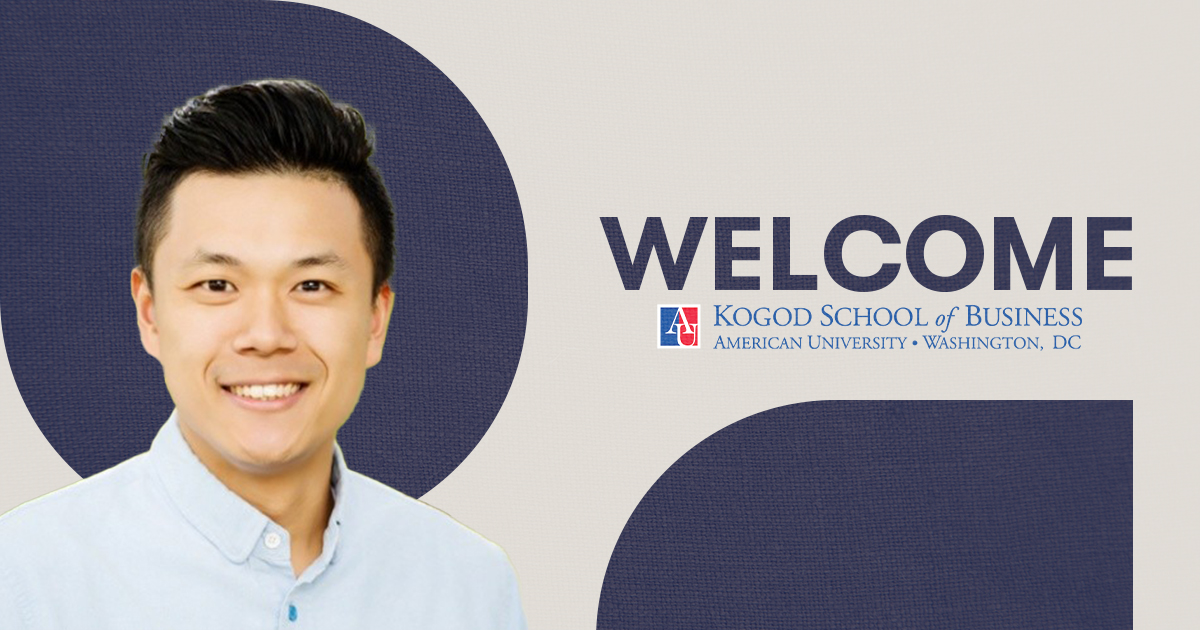
Darby Joyce
Content Marketing Coordinator
American University’s Kogod School of Business is home to faculty with ambitions to teach rising business professionals and improve the world through their research. Kogod professors take on issues including sustainability, equity, consumer well-being, and cybersecurity— and that expertise translates into an academic community where students learn about the many aspects of business. For a new professor of management, Chen Tang, Kogod is the ideal place for him to continue his work and collaborate with colleagues who share his goals.
“My passion for making a meaningful impact on real-world organizations through research and teaching led me here,” he explained. “Kogod’s commitment to cutting-edge research and high standards in teaching perfectly aligns with my career aspirations.”
Professor Tang joined Kogod shortly after completing his PhD in labor and industrial relations at the University of Illinois, Urbana-Champaign. A human resources expert who worked in the industry for three years before pursuing his doctorate, Tang’s research focuses on improving an organization’s ability to predict important work outcomes, from job performance to employee well-being. In particular, he explores how employers can improve diversity in hiring outcomes and create a more inclusive workplace overall.
“I firmly believe in diversity’s transformative potential for organizations and for society as a whole,” he said.
It's crucial for organizations to foster diversity, inclusiveness, and equality, as it leads to better performance, more creativity, and higher job satisfaction and well-being.”

Chen Tang
Professor of Management, Kogod School of Business
While working on his PhD, Tang explored these questions from the quantitative perspective by looking into how predictive models can be used in an organizational context. His dissertation, as well as several of his other published papers, explored the concept of overfitting. In this modeling issue, analysis is rooted too deeply in one particular data set. In human resources analytics, overfitting can cause unique problems, since it leads to analysis that does not necessarily reflect the diversity of experiences in the workplace. As Tang discovered through his research, organizational analysis is especially prone to overfitting, since it’s tied so closely to the sample size.
“The issue of overfitting is not new, but it is particularly relevant in an organizational context,” he explained. “Many organizations are small in size, so they typically don’t have the luxury of large data samples to build their models on.”
More recently, organizations have been countering their data limitations by using machine learning–a relationship that greatly interests Tang. Since machine learning can utilize data beyond the workplace’s own sets, HR teams can use it to deal with overfitting and get more diverse insights on how other organizations ensure fair hiring practices and strong job satisfaction. Though machine learning does a good job of filling in these gaps, Tang warns that it can do more harm than good if there’s not an expert leading the way.
“In an ongoing research project, we showed in an example that a lack of HR expertise when using machine learning to predict employee turnover may cause an issue called column-wise data leakage,” he explained. “This means that the predictive model demonstrated seemingly great accuracy the first time, but failed miserably to predict in subsequent applications.” Though it’s helpful to have more data to pull patterns from, it’s just as necessary as ever to have people on a team who can understand that data and apply it to real-world situations.
Still, Tang is excited to see machine learning and other technological advances evolve to the point where they can support human resources efforts. Machine learning and its effects on HR analytics are rapidly developing, and both the benefits and drawbacks provide windows for further study.
Machine learning will likely contribute to streamlining recruitment, employee development, and performance management, leading to more efficient and effective HR practices. But there are also debates around the legal, ethical, and fairness issues that can arise as organizations adopt machine learning."

Chen Tang
Professor of Management, Kogod School of Business
"These aspects all present exciting research opportunities," Tang said.
As he begins his first semester teaching at Kogod, Tang looks forward to getting to know his colleagues and students. He’s joining a community full of perspectives and insights on the issues that matter to him, and he’s excited to have conversations and make connections that will help him learn and fine-tune his teaching style. On the research side, he’s also looking forward to studying how emerging technologies like language models and virtual reality interact with HR practices and organizational behavior. To best prepare himself and his students for the future of work, he wants to understand the role that these innovations can play in everything from hiring to what the workplace itself looks like.
Ultimately, though, the questions Tang asks in his research come back to how to ensure that a workplace is one where all people can grow and meet their goals. From ensuring an equitable hiring process to improving diversity and inclusion in jobs, the field of management is in a position to ensure equity and fairness for employees from all walks of life.
“I’m especially interested in studying how organizations can build more diverse and productive workforces through hiring,” he said, “so job applicants from diverse backgrounds can have equal and fair access to employment opportunities where they can realize their full potential.”
